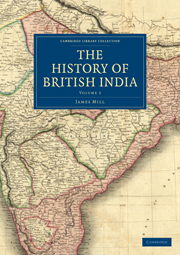Summary
Carnatic remained but a short time free from the pressure of the neighbouring powers. In the superior government of Deccan, Nizam Ali, who had resumed, upon the departure of Bussy, the commanding station which he formerly occupied, made no delay in employing all his advantages to effect the dethronement of his feeble-minded brother. On the 18th of July, 1761, he committed the Subahdar to a prison; and invested himself with the full powers and insignia of the government.
The treaty, by the provisions of which the pretensions of England and France were at this time adjusted, affords a singular illustration of the obvious and neglected truth, that the knowledge requisite for good government in India cannot be possessed by rulers sitting and deliberating in Europe. By the treaty of Paris, concluded on the 10th of February, 1763, Salabut Jung was acknowledged as lawful Subahdar of Deccan, after he had been nearly two years dethroned, and another reigning in his stead. This instrument indeed, which recognised Salabut Jung as a great sovereign, was the immediate cause of his death; for Nizam Ali, who had been withheld by dread of the restoration of the French power in India, no sooner received intelligence of the treaty of Paris, by which the French resigned Carnatic and appeared to abandon the contest, than he felt himself delivered from all restraint, and ordered his brother to be murdered in September, 1763.
- Type
- Chapter
- Information
- The History of British India , pp. 268 - 285Publisher: Cambridge University PressPrint publication year: 2010First published in: 1817



